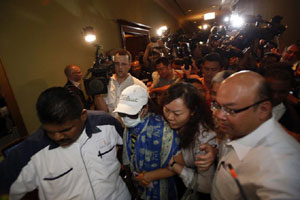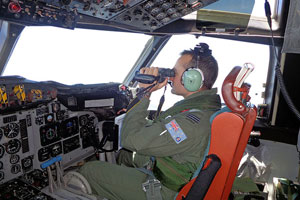WASHINGTON - The disappearance of a Malaysian plane has prompted calls for in-flight streaming of black box data over remote areas, but industry executives say implementing changes may be complex and costly.
Mark Rosenker, former chairman of the U.S. National Transportation Safety Board, said this incident and the 2009 loss of an Air France flight in the Atlantic should spur reforms in what he described an outdated accident investigation process.
Rosenker, a retired US Air Force general, said finding a way to transmit limited information from flight data and cockpit voice recorders to a virtual "cloud" database would help authorities launch accident investigations sooner and locate a plane if it got into trouble while out of reach of ground-based radars.
"This is the second accident in five years where we've had to wait to get the black boxes back," Rosenker said. "We need to bring the concept of operations for accident investigations and the technology of what is available up to the 21st century."
Twenty-six nations have been searching for the missing Boeing Co 777 airliner over an area roughly the size of Australia for 12 days, but the massive hunt has found no trace of any wreckage thus far.
Mary Kirby, editor of the aviation industry website Runway Girl Network, said airlines could use the growing number of broadband connections that allow passengers to access the Internet and download movies to provide real-time GPS data for just such emergencies.
"Airlines realize that this is the cost of doing business," she said. "It is inexplicable to be bringing these big fat connectivity pipes to aircraft and yet to be in a situation in 2014 where you can lose a plane."
COSTLY, CHALLENGING CHANGE
Aviation experts and industry executives say it should be technically possible to stream flight recorder data to a database or a virtual "cloud," but warned about broadband constraints and the high cost of equipping older airliners with new electronic equipment.
They say new satellite-based air traffic management systems being implemented in the United States, Asia and Europe in coming years will make it easier to track airplanes and monitor aircraft systems in flight, but note it will take a decade or more before the systems are commonplace worldwide.
Streaming the huge amounts of data now collected by flight data recorders may also pose technical challenges, while transmission of cockpit voice recordings could raise privacy concerns, said analyst Richard Aboulafia with the Teal Group.
Rosenker, the former NTSB chief, said investigators could agree on a much smaller subset of key data to transmit, which would save bandwidth and cost. The data could even be sent at intervals instead of continuously streamed, he said.
Most airplanes already have systems known as Aircraft Communications Addressing and Reporting System (ACARS) that periodically report, either via VHF radio or satellite, on the performance of the aircraft and its engines, which could provide another possibility for getting data to investigators.
One industry executive said he fully expected reforms after this incident, but said airlines were more likely to increase the amount of data they were receiving from the existing ACARS system rather than opting to stream flight data.
"It would just be too costly. There are 93,000 flights a day, and we've had two incidents like this in four or five years," said the executive, who was not authorized to speak publicly since the search for the plane continues.
 |
 |